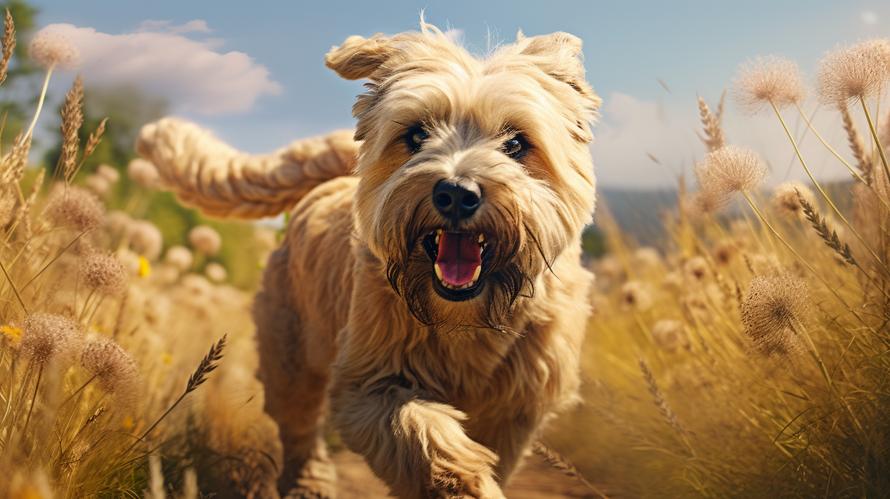Let’s dive straight into an intriguing topic that may have never crossed your mind before. Have you ever wondered what your Soft Coated Wheaten Terrier’s ancestors ate? No? Well, guess what? Their diet was, in fact, nothing like the commercial dog food we see on the shelves today. It primarily consisted of raw meat, minor amounts of fruits and vegetables, and even fewer grains. Knowing this, a lingering question remains; should Soft Coated Wheaten Terriers eat grain-free?
Before we delve deeper, it’s essential to know that Soft Coated Wheaten Terriers, or ‘Wheatens’ as they are affectionately known, originated from Ireland. As farm dogs, they were bred for their herding, guarding, and hunting prowess. Today, they are cherished for their friendly and playful demeanor and their signature coat of soft, silky, and wheat-colored hair that gave them their name.
Trademark traits aside, like any other pet, the key to a Wheaten’s vibrant health is a balanced diet that meets its specific nutritional needs. While commercial dog food is an easy go-to, have you ever given thought to just how suitable these packaged and processed foods are for your canine pal? Some believe that a grain-free diet closely mirrors the ancestral diet of dogs, and hence, it might be better for them, but is that really the truth?
As we pull the curtain back and look deeper into the grain-free diet and whether it’s suitable for your Wheaten, we’ll explore both the advantages and potential risks. As we uncover this mystery, you’ll be able to make an informed decision about the most appropriate diet for your four-legged friend.
Many pet owners have turned to grain-free diets for their dogs due to perceived benefits like better skin and coat health, more energy, smaller stools, and fewer allergy issues. Some argue that since dogs, including Wheatens, are primarily carnivores in the wild, grains are not a natural part of their diet, and a diet high in protein and low in carbohydrates can provide them with their nutritional needs in a more efficient way.
However, it is important to remember that while your lovely Wheaten intrigues you with its playful antics, it’s no longer living the life of its wild ancestors. Over thousands of years, dogs have evolved alongside humans and their digestive systems have adapted to a more varied diet, including grains. Surprisingly, grains can offer a wide range of nutrients that your dog might need. They are an excellent source of vitamins, minerals, and essential fatty acids. They also provide dietary fiber which aids in digestion.
Despite the potential benefits, you might wonder why grain-free diets have gained popularity. It largely stems from the misconception that grains are bad for dogs. Some dogs are indeed allergic or intolerant to grains but such cases are relatively rare. A major study by Cummings Veterinary Medical Center at Tufts University revealed that out of all food allergies in dogs, only around 10% are caused by grains.
The most common culprits are, in fact, beef, dairy, and chicken. Symptoms of food allergies in dogs might include itchiness, excess gas, recurrent ear problems, or gastrointestinal upset. If you notice any of these symptoms in your Wheaten, it’s vital to consult with a vet before making any major changes to their diet.
An important consideration when pondering over grain-free diets is the recent concern raised by the Food and Drug Administration (FDA). The agency revealed that grain-free diets might have a potential link to a heart condition in dogs called dilated cardiomyopathy (DCM). Several cases of DCM were reported in dogs that were primarily fed grain-free diets, although a definitive connection has not yet been established.
This revelation doesn’t mean all grain-free diets will cause health problems. It’s the balance and source of nutrients that matter most. Nevertheless, caution is advised when considering a grain-free diet for your Wheaten.
Ultimately, it’s not about whether your Soft Coated Wheaten Terriers should eat grain-free or not. It’s about feeding them a balanced and nutritious diet that meets their individual requirements. Your dog’s breed, size, age, weight, activity level, and overall health all play a critical role in determining the best diet for them.
If you choose to go the grain-free route, do so with adequate knowledge and the advice of a veterinarian or a canine nutrition expert. Feed a diet that provides your Wheaten with high-quality protein, heart-healthy fats, and a diverse range of fruits and vegetables. If you choose to include grains, opt for whole grains like brown rice, quinoa, or oats.
No dog is the same, and what works for one might not work for another. So, even within the same breed, a food that suits one Wheaten might cause problems for another. Always be sure to monitor your dog’s health and adjust their diet as needed. The key is to stay informed, be observant, and always prioritize your furry friend’s health and well-being.
Remember, diet contributes significantly to your Wheaten’s energy levels, body condition, shiny coat, and, most importantly, happiness. Just like with humans, a healthy diet can equate to a longer and happier life for your Soft Coated Wheaten Terrier. After all, they do not just fill your life with joy, but they also rely on you for the best life they can lead.



